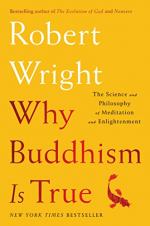
|
| Name: _________________________ | Period: ___________________ |
This test consists of 15 multiple choice questions and 5 short answer questions.
Multiple Choice Questions
1. What experiments are said to have "powerfully demonstrated the capacity of the conscious self to convince itself that it is calling the shots when it is not" (79)?
(a) Colostrum experiments.
(b) Split-brain experiments.
(c) Dual-self experiments.
(d) Corpus callosum experiments.
2. How did the author feel when his meditation teacher told him that his frustration with meditation was a good sign?
(a) Assured.
(b) Patronized.
(c) Ashamed.
(d) Proud.
3. What two drugs does the author say he imagines produce results similar to the feelings he had after a particularly good session of meditation at his first retreat?
(a) Cocaine and valium.
(b) LSD and psilocybin.
(c) LSD and heroin.
(d) Valium and heroin.
4. The author states that when the Buddhist techniques work, a person receives not just happiness, but what other element?
(a) Tranquility.
(b) Clarity of vision.
(c) Improved health.
(d) A youthful smile.
5. In most people, the left hemisphere of the brain controls what?
(a) Decision-making.
(b) Emotions.
(c) Language.
(d) Affection.
6. What do psychologists call the condition of "being stuck" in the natural human cycle of ultimately futile pleasure-seeking?
(a) The never-ending spiral.
(b) The great illusion.
(c) The hedonic treadmill.
(d) The hamster wheel.
7. How many parts belong to the Path that "deeply committed Buddhists are supposed to tread" (48)?
(a) Eight.
(b) Six.
(c) Four.
(d) Three.
8. When ancient Buddhist writings mention the term sati, what does the word mean in English?
(a) Stillness.
(b) Tranquility.
(c) Mindfulness.
(d) Peace.
9. Which group of people does the author say especially identified with the film he references within the chapter title "Take the Red Pill"?
(a) Western Buddhists.
(b) Tibetan Buddhists.
(c) Taoists.
(d) Cartesians.
10. In what state did the author attend his very first silent meditation retreat?
(a) Washington.
(b) California.
(c) Massachusetts.
(d) Virginia.
11. What does the acronym in the chapter title of Chapter 6 mean?
(a) Missing in Action.
(b) Laugh Out Loud.
(c) Immaterial.
(d) Not in my backyard.
12. What is the name of the professor of Psychology at Pennsylvania State University discussed by the author?
(a) Robert Kurzban.
(b) Ngo Dinh Diem.
(c) Malcolm David Eckel.
(d) Martin Daly.
13. What is NOT an element the author lists as being said by Jesus Christ?
(a) I am the way.
(b) I am the life.
(c) I am the truth.
(d) I am the love.
14. In what year did the author attend his first silent meditation retreat?
(a) 1996.
(b) 1987.
(c) 2005.
(d) 2003.
15. What two points of view does the author use within the narrative of Buddhism is True?
(a) Second and third.
(b) First and third.
(c) First and second.
(d) Only third.
Short Answer Questions
1. What kind of benefits does the author describe self-delusion as harboring?
2. The Buddah lived and taught how many years ago?
3. What is the title of Chapter 2 of Buddhism is True?
4. The author states that "More and more, groups of people define their identity in terms of" (17) what?
5. The author uses the example of his childhood experiences with the Tooth Fairy in order to demonstrate what concept?
|
This section contains 478 words (approx. 2 pages at 300 words per page) |

|




